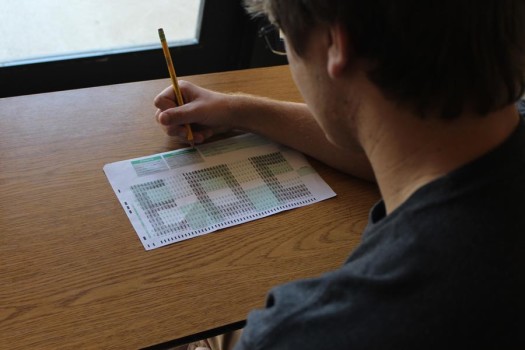Students are taking less standardized tests this year and new graduation requirements will be put in place because of recent state legislation.
The Texas Legislature passed House Bill 5 over the summer, decreasing the number of required End of Course tests. Rather than the previous 15, students only need to pass five to graduate. English I, English II, Algebra, Biology and U.S. History are the only courses that will now have EOC exams. The tests will be given when the course is completed, not by grade level. This will affect all students, freshmen through seniors.
“We firmly believe the over-reliance on a ‘one-day’ multiple choice test doesn’t demonstrate true learning,” Superintendent Dr. Stephen Waddell said in a LISD website statement. “Focusing our instruction on the state’s latest multiple choice test is not in the best interest of students when our desire is for our students to learn beyond the minimum of what the state dictates.”
Last year there was a total of 185 tests given at the school, on EOC, AP and PSAT tests, interrupting 45 out of 185 days of school. With this new policy, there will only be approximately 20 days of state testing.
“This isn’t something we have seen or dealt with before, so we’re not sure the effect it will have,” testing coordinator Brenda Glidewell said. “The new requirements should work for the benefit of the students.”
The English and Reading EOC test will now be combined into one as a single English-Language Arts test. Students previously needed to pass three out of every five tests.
When the current juniors were in ninth grade, students that failed tests were not required to retake them. According to the law, now those students are required to pass those tests to graduate. Knowles said that tests will be much more difficult, considering that there could be a two year time period between when students took the course and when they retake the test.
This year, teachers were able to look at the tests before their release to allow them to properly prepare students. Knowles said he believes that this will have a positive impact on the students’ scores.
“I think success rates are going to go up,” Knowles said. “You can’t prepare for a program if you don’t know what the program is.”
The new law also gives teachers more instructional time that will not be interrupted by testing schedules.
“It seems like what you learn in class is always different than what is on the EOC,” sophomore Anna Wedler said. “Now it can be more accurate.”
House Bill 5 will change the basic graduation requirements, beginning in the 2014 school year. The current 4×4 graduation plan requires four reading, math, science and history credits. This program will require three credits each for English, math, science, and social studies. Students will instead, be able to take other classes called endorsements, which are career focused classes.
“The endorsements should be good because now you don’t have to take the classes that aren’t relevant for your plans in the future,” freshman Landry Turner said.
Some of these endorsement areas are science, engineering, business and industry, arts and humanities and multidisciplinary studies. The new program can possibly remove the requirement to take English IV and a fourth science. English IV will be replaced with another state approved English course.
“Whenever the state revises its graduation plan and assessment requirements, many high school students get caught in that transition,” Commissioner of Education Michael L. Williams said in an online statement.
Because of this, the freshmen, sophomores and juniors who are currently in the 4×4 program will be able to choose if they want to switch to the new policy.
“The new graduation requirements are good for students who already have their future planned out,” Wedler said. “For those kids who aren’t sure what they want to do yet, it could just stress them out.”
The changes being made under House Bill 5 will impact students, teachers, and administrators around the district and state.
“Like every program we’ve had, this will take some changes,” Knowles said. “In the end, these changes should allow our students to be better prepared for the future.”










